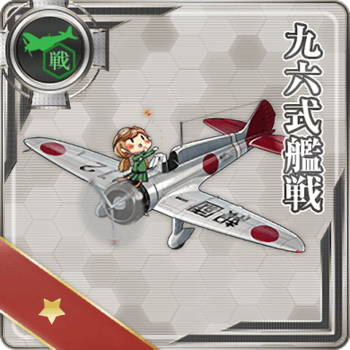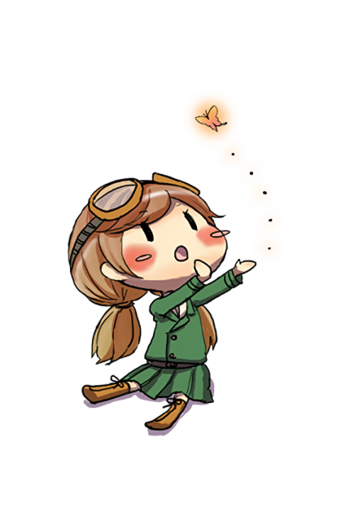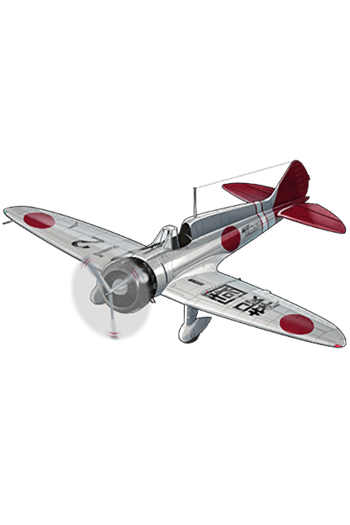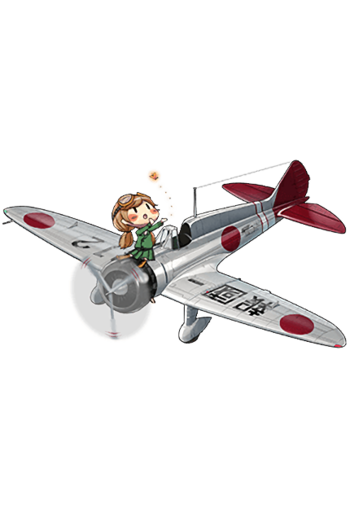- Welcome to the Kancolle Wiki!
- If you have any questions regarding site content, account registration, etc., please visit the KanColle Wiki Discord
Difference between revisions of "Type 96 Fighter"
Jigaraphale (talk | contribs) m |
m (Reppuu (Strong Gale) redirect path changed, fixing previous links. Updated equipment link names) |
||
| Line 42: | Line 42: | ||
The predecessor of the infamous Mitsubishi A6M ''Zero'', the '''Mitsubishi A5M''' (''Type 96 Carrier-based fighter,'' Allied reporting name "Claude") was the world's first ship-based monoplane fighter. | The predecessor of the infamous Mitsubishi A6M ''Zero'', the '''Mitsubishi A5M''' (''Type 96 Carrier-based fighter,'' Allied reporting name "Claude") was the world's first ship-based monoplane fighter. | ||
| − | Developed by a team led by Jiro Horikoshi (who would go on to head development of the [[Type 21 | + | Developed by a team led by Jiro Horikoshi (who would go on to head development of the [[Type 0 Fighter Model 21|A6M]] and [[Prototype Reppuu Late Model|A7M]]) to the 1934 ''9-shi'' specification for an advanced fighter plane, the Mitsubishi ''Ka-14'' competed with Nakajima's prototype. The first prototype which flew in February 1935, was an all-metal-airframe low-wing fighter using an inverted gull wing and fixed undercarriage powered by Nakajima's 600 hp ''Kotobuki 5'' engine. |
Requirements of the ''Type 9'' specification were a top speed of 350 km/h at 3,000 m with the capability of climbing to 5,000 m in 6.5 min, and the Ka-14's performance greatly surpassed all requirements, with a maximum speed of 450 km/h while being quite maneuverable. An aerodynamically revised design with conventional wings was ordered into production as the Mitsubishi ''A5M''. | Requirements of the ''Type 9'' specification were a top speed of 350 km/h at 3,000 m with the capability of climbing to 5,000 m in 6.5 min, and the Ka-14's performance greatly surpassed all requirements, with a maximum speed of 450 km/h while being quite maneuverable. An aerodynamically revised design with conventional wings was ordered into production as the Mitsubishi ''A5M''. | ||
Revision as of 04:53, 11 February 2023
[Edit]
No.19 九六式艦戦
| |
| Refittable Ship Types | |
| Fast Battleship | Battleship |
| Aviation Battleship | Standard Aircraft Carrier |
| Armored Carrier | Light Carrier |
| Heavy Cruiser | Aviation Cruiser |
| Light Cruiser | Torpedo Cruiser |
| Training Cruiser | Destroyer |
| Coastal Defense Ship | Submarine |
| Aircraft Carrying Submarine | Seaplane Tender |
| Fleet Oiler | Submarine Tender |
| Repair Ship | Amphibious Assault Ship |
| LBAS Plane | |
Introduction
旧式の艦上戦闘機です。
零戦より前に実戦配備されていた旧型機ですが、優れた格闘戦能力を持っています。
武装や航続力、速度の点で既に二線級ではありますが、防空戦闘には活用可能です。
This is an obsolete carrier-based fighter.
It is an old machine that was in operational service before the Zero-fighter, and boasts a history of exemplary aerial combat performance.
With standard armaments and cruising capacity, its speed is now second class, but it is still possible to utilize this aircraft in a dogfight.
Mechanics
Fighters![]()
![]() /
/![]() are one of the main types of plane used by CV(B/L). Their main role is to bring Air Power during the 1st Aerial Stage, with their "Fighter Power"
are one of the main types of plane used by CV(B/L). Their main role is to bring Air Power during the 1st Aerial Stage, with their "Fighter Power" ![]() stat being the most important factor in this regard. Fighters are additionally needed for Aircraft Carrier Cut-Ins (CVCI) during the day Shelling.
stat being the most important factor in this regard. Fighters are additionally needed for Aircraft Carrier Cut-Ins (CVCI) during the day Shelling.
- They can be used in Land Bases to serve the same role as Interceptors.
Notes
How To Obtain
Buildable
Stock equipment of: Hiyou , Junyou
, Junyou , Ryuujou
, Ryuujou
From quest: B119 (x3, choice)
Uses
Used to improve: Type 96 Fighter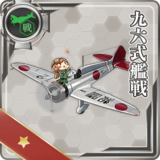 , Type 96 Land-based Attack Aircraft
, Type 96 Land-based Attack Aircraft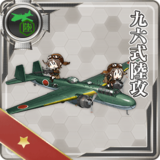 , F4F-3
, F4F-3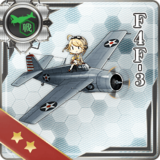 , Type 1 Fighter Hayabusa Model II
, Type 1 Fighter Hayabusa Model II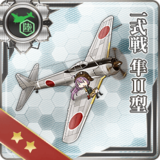 , Skua
, Skua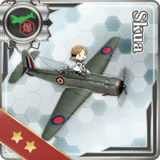 , Spitfire Mk.I
, Spitfire Mk.I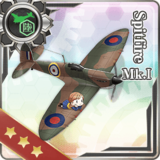 , O Type Observation Autogyro Kai
, O Type Observation Autogyro Kai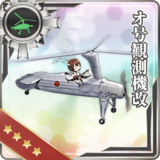
Used by quest: F22, F35, F37, F48, F70, F90
Updates History
- 2013-04-23: Implemented with initial game release
- 2015-11-18: Proficiency gain updated to be possible like other planes
- 2016-06-30: Became improvable and upgradeable to Type 0 Fighter Model 21
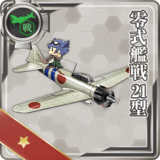
- 2017-03-17: Card CG updated
- 2018-11-29: Stats increased:
 +2
+2  +0 →
+0 →  +3
+3  +1
+1 - 2019-08-08: Visible bonuses added
- 2020-03-27: Visible bonuses increased
- 2021-10-15: Upgrade target changed to Type 96 Fighter Kai
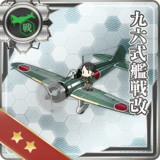
Fit Bonuses
| Type 96 Fighter Equipment Bonuses | |||||||||||||||||||||||||||||||||||||||||||||||||||||||||||||||||||||||||||||||||||||||||||||||||||
|---|---|---|---|---|---|---|---|---|---|---|---|---|---|---|---|---|---|---|---|---|---|---|---|---|---|---|---|---|---|---|---|---|---|---|---|---|---|---|---|---|---|---|---|---|---|---|---|---|---|---|---|---|---|---|---|---|---|---|---|---|---|---|---|---|---|---|---|---|---|---|---|---|---|---|---|---|---|---|---|---|---|---|---|---|---|---|---|---|---|---|---|---|---|---|---|---|---|---|---|
| Ship | Extra Requirement | Note | |||||||||||||||||||||||||||||||||||||||||||||||||||||||||||||||||||||||||||||||||||||||||||||||||
Houshou Kai Ni /Sen 
|
- | +3 | +4 | +3 | +4 | ||||||||||||||||||||||||||||||||||||||||||||||||||||||||||||||||||||||||||||||||||||||||||||||
Houshou Base/Kai 
|
- | +2 | +3 | +2 | +3 | ||||||||||||||||||||||||||||||||||||||||||||||||||||||||||||||||||||||||||||||||||||||||||||||
Kasuga Maru-class  Taiyou-class   
|
- | +2 | +1 | +3 | +1 | ||||||||||||||||||||||||||||||||||||||||||||||||||||||||||||||||||||||||||||||||||||||||||||||
| Other CVL | - | +1 | +1 | ||||||||||||||||||||||||||||||||||||||||||||||||||||||||||||||||||||||||||||||||||||||||||||||||
Improvement
| Improvement | ||||||||||
|---|---|---|---|---|---|---|---|---|---|---|
| 1★ | 2★ | 3★ | 4★ | 5★ | 6★ | 7★ | 8★ | 9★ | Max★ | |
| 0.2 | 0.4 | 0.6 | 0.8 | 1.0 | 1.2 | 1.4 | 1.6 | 1.8 | 2.0 | |
Historical Information
The predecessor of the infamous Mitsubishi A6M Zero, the Mitsubishi A5M (Type 96 Carrier-based fighter, Allied reporting name "Claude") was the world's first ship-based monoplane fighter.
Developed by a team led by Jiro Horikoshi (who would go on to head development of the A6M and A7M) to the 1934 9-shi specification for an advanced fighter plane, the Mitsubishi Ka-14 competed with Nakajima's prototype. The first prototype which flew in February 1935, was an all-metal-airframe low-wing fighter using an inverted gull wing and fixed undercarriage powered by Nakajima's 600 hp Kotobuki 5 engine.
Requirements of the Type 9 specification were a top speed of 350 km/h at 3,000 m with the capability of climbing to 5,000 m in 6.5 min, and the Ka-14's performance greatly surpassed all requirements, with a maximum speed of 450 km/h while being quite maneuverable. An aerodynamically revised design with conventional wings was ordered into production as the Mitsubishi A5M.
It was introduced in 1936 and entered service in early 1937 as the A5M1 armed with twin 7.7 mm machine guns, soon facing combat at the start of the second Sino-Japanese war. Contemporary opponents such as the Boeing P-26C ("Peashooters") and the Curtiss Hawk Ⅲ, were poorly matched against the A5M, which proved effective and resistant to damage. A5Ms also served as escorts for the Mitsubishi G3M bombers.
Mitsubishi's development team continued to improve the A5M up to the final A5M4, with improvements such as a more powerful engine, additional drop fuel tank, and closed cockpits. Altogether 1,083 A5Ms were manufactured by Mitsubishi, Watanabe, and Naval Ohmura Arsenal, including 103 two-seat trainers.
The A5M series continued in service after 1941, but had been replaced by the A6M as the standard fighter of first-line carriers. The last battle of the A5Ms as fighters was the Battle of the Coral Sea in May 1942. As World War II came to a close, most remaining A5Ms were repurposed as kamikaze aircraft.
